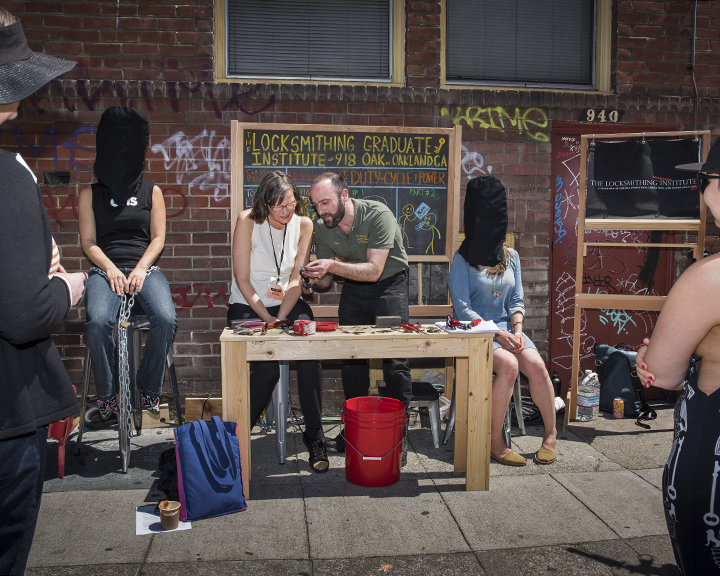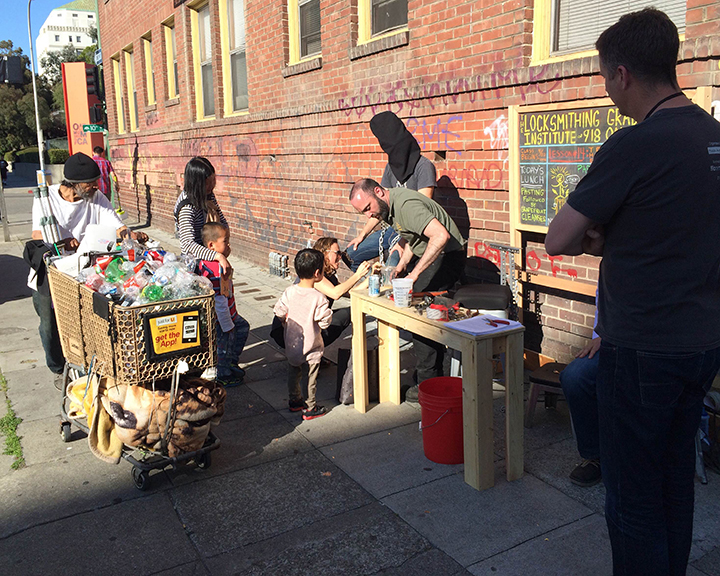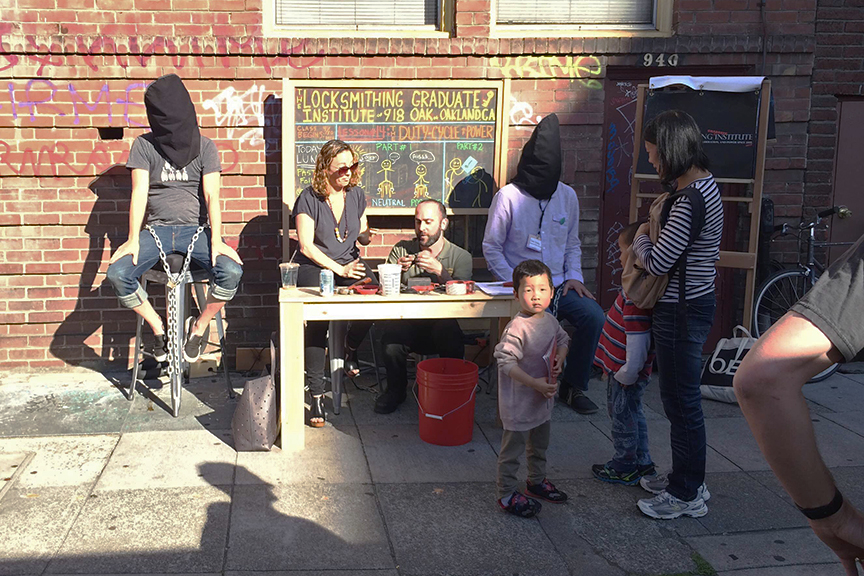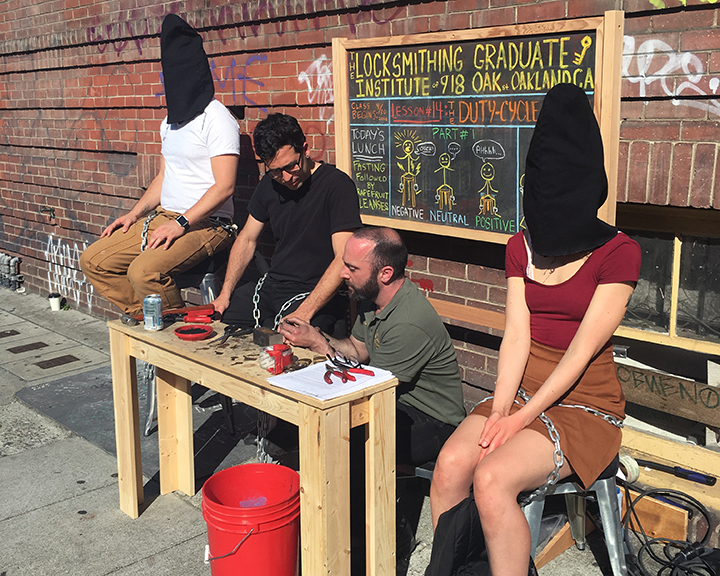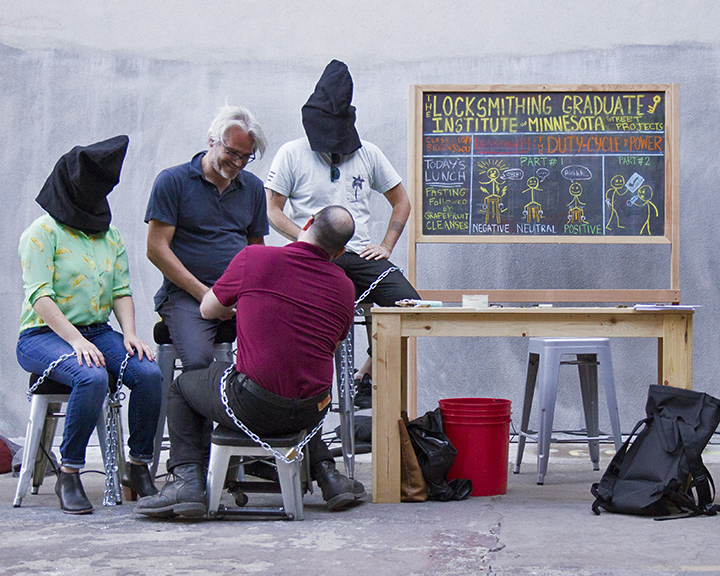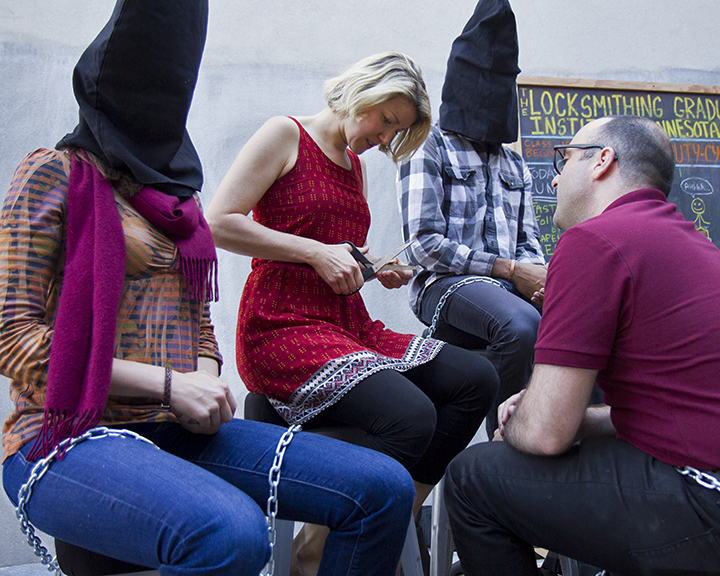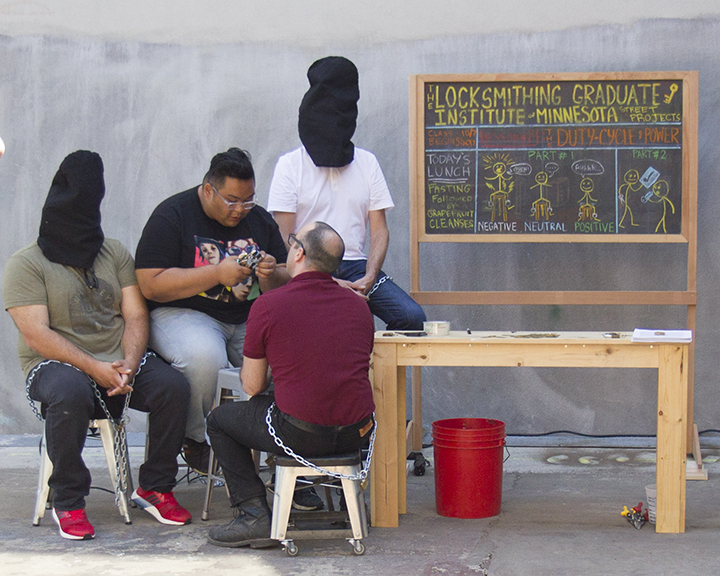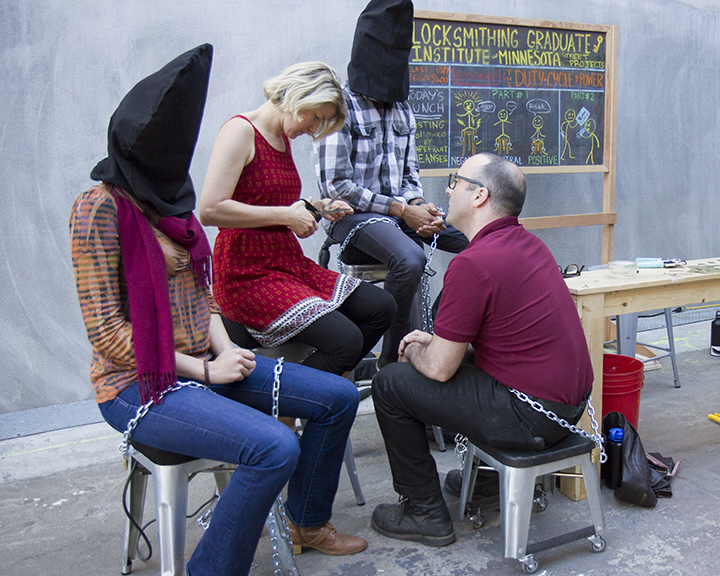The Locksmithing Graduate Institute of 918 Oak Street and Minnesota Street Project, Oakland and San Francisco, CA, 2016-7
On April 3, 2016 and October 7, 2017 I taught the 14th Lesson of the The Locksmithing Graduate Institute. Students were given the opportunity to work in teams of three to create a physical “power circuit” between one another by utilizing three of my custom made stools. One stool produced the “positive” charge of mild pleasure by vibrating when a person sat on it. The second stool delivered the “negative” charge by allowing a participant to receive a mild electro-static shock when they sat down. The third student acted as the “neutral” conduit between the first students by sitting down a on third stool that had trigger rigged inside of the seat which activated the vibration and shock of the other two stools. The third “neutral” student was then taught how to make a key that would unlock all three students from their predicament by using simple everyday materials and a pair of scissors. Special thanks to Katherine O’Toole and Josh Self for shooting the video of the piece. And also special thanks for Christopher Woodcock and Katherine O’Toole for shooting the photographes. Lastly, tremendous thanks to Christoper Lux and Brion Nuda Rosch for supporting my work and giving me the opportunity to interact with community. Lesson plan below:
The Locksmithing Graduate Institute of 918 Oak Street and Minnesota Street Project
Lesson #14: The Duty-Cycle of Power
The faculty and staff of The Locksmithing Graduate Institute are pleased to announce its first class in almost three years. In Lesson #14 students will work in teams of three to a create a physical power-circuit between one another in which one person receives a “positive” charge of subtle pleasure, the second person receives a “negative” charge of minor discomfort, while the third person becomes the “neutral” conduit between the two that facilitates their experiences. In the second part of the class the “neutral” student will be taught how to break the cycle and empower themselves by making a key out of ordinary materials that will unlock their two peers from their “positive” and “negative” predicaments.
In United States’ Declaration of Independence, Thomas Jefferson asserts that power is derived from the consent of the governed. Most situations in the universe don’t intrinsically have power. We endow objects, people, and institutions with power in hopes that they will serve the better good. Too often many of us see power as something that is a fixed and permanent possession of the powerful when in reality power is a temporary, ever-changing, and mutable condition. We assume that the dominant objects, people, and ideas that we perceive to be powerful, have always been and always will be powerful. The conditions which cause us to culturally mistake these temporary circumstances that create power to be permanent conditions arises from a complicated educational process that begins for each of us at birth. This process was best described by the sociologist Pierre Bourdieu is his book Cultural Reproduction and Social Reproduction. To grossly paraphrase the book, he asserts that from our very earliest age individuals growing up in a place such as the United States are told over and over that everyone is equal (“neutral”) and that everyone has same access to the same unalienable rights as everyone else does. To reinforce this idea our educational system presents itself to be equal and neutral as well and promotes a system in which every person is supposedly taught the rudimentary tools necessary to succeed in life. However, what the educational system fails to teach is how to access the power embedded within our complicated bureaucratic and societal systems. The tools associated with this knowledge is what Bourdieu referred to us “cultural capital”. This type of currency takes the form of things such as social graces, manner of speech, and physical deportment that individuals born and raised in the upper echelons of society are taught from birth. Although education is theoretically offered to everyone, our shared cultural wealth is only available to those who have the keys, codes, or cultural capital to access it for themselves.
In light of this many of us often endow objects, people, and institutions with power simply because we don’t feel like we have the keys or cultural capital to open these situations. However this is not the case. Most of the locked systems that we come in contact with (be they physical or cultural) are not secure systems in any way shape or form. We take for granted that most objects and institutions have power only because we allow them to have power. Most of the locks in our lives don’t provide any real security. Instead their function is give a person utilizing the locks a “feeling” or a “sense” of security. And because of this, the person possessing the keys or codes to enter those physical, mental, and societal spaces has the incredible gift that power truly provides: access. In Lesson #14 students will learn tactics to break this cycle of power by creating a key out of ordinary materials. The “neutral” student will learn that their temporary state is not a powerless one and that they can take action to interrupt the “positive” and “negative” experiences of their two peers who are experiencing pleasure and pain. The action of making this key isn’t about subverting the action of the lock. On the contrary, it is to show that the security that a lock provides and the access that the key symbolizes is meaningless and only exists because we allow it to exist. These power structures are temporary and within our control and in turn we each have the power to interrupt the “positive” and “negative” situations that are affecting the world around us. And, once empowered, it is our duty to take action. Having power isn’t a bad thing. The only question that is important is what will a person choose to do with the power that they have. Will they waste it? Deny it? Abuse it? Or will they seize it and utilize to break the duty-cycle of power.
The faculty and staff of The Locksmithing Graduate Institute want to remind its students and alumni that the world doesn’t need any more saviors nor is it a person’s responsibility to save anyone else. The duty-cycle of power is about personal responsibility and recognizing that we are responsible for how our actions and inactions affect everything around us regardless of our intentions. If we do nothing and do not utilize our power we have effectively consented and enabled the present trajectory of our global path.
Lastly, we at The Locksmithing Graduate Institute have always believed that there is a devotional aspect to creating the schools curriculum and want the lessons to function and as service to the world. The faculty and staff feel incredibly lucky to have found something that we excel at and feel that it is our duty to provide this service to the best of our ability and share it freely with as many people as possible. We have embraced the notion of being content in our work and to be thankful for all that we have. However, the question we struggle with every day is this: How do we know if this attitude of acceptance and gratitude isn’t simply reinforcing and enabling an unjust system? We hope that present and former students can help educate us in regards to this question.
As always tuition is free and enrollment is open to people of all ages and abilities. Today’s lunch will be a fast followed by a grapefruit cleanse.
